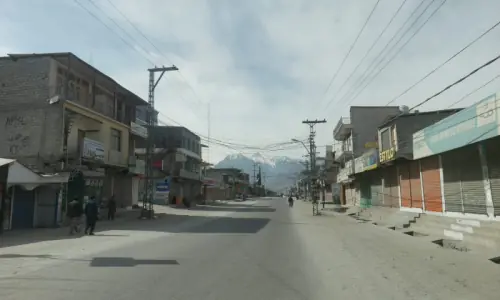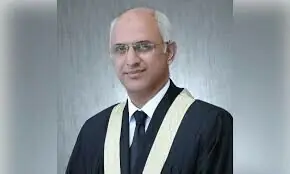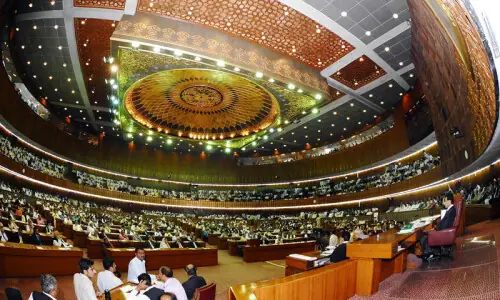ISLAMABAD: Pakistan’s war against Covid-19 is planned, coordinated and controlled from one room. Bedecked with flashing screens dripping with data-drenched information and sporting a giant ‘media wall’ decorated with video feeds from across the length and breadth of the country, the room is buzzing with subdued activity this Saturday morning.
Welcome to the headquarters of the National Command and Operations Centre, better known as NCOC. Every morning men and women tasked with leading the national effort against Covid-19 gather in this room and chalk out battle plans with the help of all the provinces.
The NCOC is the implementation arm of the National Coordination Committee chaired by Prime Minister Imran Khan. Dawn got a rare access to witness the action inside NCOC.
A few minutes before 10am, Asad Umar walks in and a hush begins to descend across the room. He has been tasked by the prime minister to chair this body. As the clock turns to 10am, 14 gentlemen slide into swivel chairs on the giant main table.
Mr Umar is joined at one corner of the table with Lt Gen Hamood-uz-Zaman Khan. He is the coordinator for NCOC. Civil and military personnel form a good mix. Three-, two- and one-star officers are joined by cabinet members including Hammad Azhar, Khusro Bakhtiyar, Razzaq Dawood, Umar Ayub and Fakhar Imam. Khyber Pakhtunkhwa Health Minister Taimur Jhagra is also here. Soon Moeed Yusuf walks in, followed in a while by Dr Firdous Ashiq Awan.
The giant screen on the wall flickers to life. Dr Azra Pechuho, Sindh’s health minister, peers out from one sub-screen while her counterpart from Punjab Dr Yasmeen Rashid is sitting in the next window alongside the chief secretary. Balochistan, AJK and GB are represented by senior officials ready with their updates.
The proceedings start with a detailed overview of the situation by a senior officer. Mr Umar, perhaps in a bipartisan gesture, gives the floor first to the Sindh health minister. Far removed from the political fireworks on the media, here the exchange between two senior leaders of PTI and PPP is polite and professional.
Dr Pechuho asks for advice on how to cordon off hotspots in Karachi where people are testing positive. “Should we engage law enforcers,” she asks, “do we need to lockdown the whole community or certain areas?” These are genuine questions put in earnest to the federal government.
Referring to reports that a large number of dead bodies brought to hospital were Covid-19 positive, she says except 15, others were not. At one point Mr Umar says to the Sindh health minister: “Dr Azra you are reading our mind here.”
The focus today is on what is called TTQ, which stands for ‘Track, Test and Quarantine’. NCOC is putting together standard procedures and guidelines with the help of provinces so there is uniformity in the process across the country. These should be ready by next week. “We need to understand numbers and clusters,” says a participant.
Discussion moves along at a swift pace and Mr Umar keeps a tight control to ensure participants do not veer off into tangents. Dr Faisal Sultan, the focal person for the entire Covid-19 national effort, appears to live up to his title as the meeting zooms in on his analysis and interpretation of the latest numbers and charts that adorn the media wall.
The NDMA chairman wants to send medical equipment to the hospitals directly instead of routing it through a province. “We sent some equipment (from Islamabad) for a Rawalpindi hospital which had to go to Lahore and then was sent back to Rawalpindi,” he says. NCOC agrees. Red tape needs to be cut.
It is clear this is a data-driven forum. All ministries and related organisations input into this data pool as assigned by the body. This data becomes the key ingredient for trends and projections which in turn form the basis of decisions that shape policy made by the NCC.
The health ministry’s projections displayed on screen are cause for cautious optimism for the participants: Infections by April 25 are 15,549; numbers projected till May 10 are 51,319. These are below what was initially feared. NCOC concludes Pakistan has enough ventilators till the first week of June. “Our nose is above the water,” says Dr Sultan.
NCOC is driving national policy. The prime minister depends on it. Mr Umar runs it efficiently. He is analytical and cuts off people when they ramble (which many do). The forum combines civilian expertise with military efficiency in getting things done.
However, NCOC could do better with more medical experts. In its present form the focus appears to swerve instinctively towards administrative solutions. Covid-19 is essentially a public health issue. If a few top epidemiologists and other specialists were members of NCOC the decision-making would be enriched and balance the administrative approach with a purely medical one.
This core decision-making forum was the brainchild of someone smart enough to realise that the best of civil-military expertise was needed to combat Covid-19. Like every effective body, NCOC may want to keep innovating and improving its own functions by ensuring it makes decisions that are grounded on best medical and scientific reasoning. These can then be implemented with effective administrative prowess that was on display in this impressive command and control room on a rainy Saturday morning.
Published in Dawn, April 19th, 2020

































